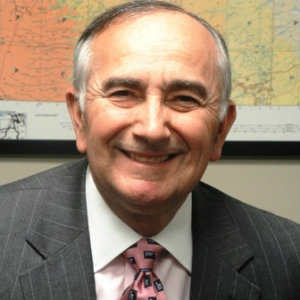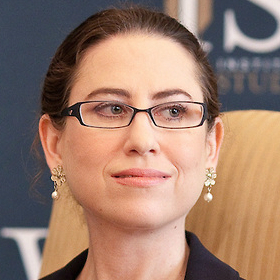Ronald Reagan: The Peacemaker
Examine how Ronald Reagan confronted the Soviet Union and won the Cold War.
Fall 2021
Online Seminar
This seminar is devoted to Charles de Gaulle, the mythic general who rallied the Free French during World War II and later founded the Fifth Republic of France, and organized around the acclaimed one-volume biography by British historian Julian Jackson.
Through readings and seminar discussions, fellows will explore the life, worldview, methods, and personality of Charles de Gaulle. In doing so, they will explore the world-historical events that both shaped his fate and that he himself shaped: the decline of French power amidst the rise of Germany; France’s pyrrhic victory in the First World War and its total collapse during the Second; its political and social upheavals from the 1930s to the 1960s; its wrenching extrications from Vietnam and Algeria; and its struggle to establish a new role for itself in a world dominated by a new set of great powers whose capabilities dwarfed its own.
The seminar will study de Gaulle’s triumphs and defeats—how he came to power, responded to crises, and pursued his objectives—and in doing so, examine the sources of his “greatness” and “grandeur.” Fellows will have the opportunity to reflect on the role of individual personality in history and what makes for great leadership—and also great biography.
Image: The Liberation of Paris, 25 – 26 August 1944, Imperial War Museum
Vance Serchuk on Studying De Gaulle
Fellows will meet for seven evening sessions, held from 6 PM to 8 PM ET on Tuesdays via Zoom. Each fellow will be tasked with two brief reflection papers (1,000-1,500 words) during the course.

Vance Serchuk is Executive Director of the KKR Global Institute and an Adjunct Senior Fellow at the Center for a New American Security. Prior to joining KKR, Mr. Serchuk served for six years as the senior national security advisor to Senator Joseph Lieberman (I-Connecticut).

Vance Serchuk is Executive Director of the KKR Global Institute and an Adjunct Senior Fellow at the Center for a New American Security.
Prior to joining KKR, Mr. Serchuk served for six years as the senior national security advisor to Senator Joseph Lieberman (I-Connecticut). In this capacity, he worked on a broad range of international issues, including comprehensive sanctions legislation, the U.S. rebalance to the Asia-Pacific, and the U.S. response to the Arab Spring, traveling to over 60 countries in Asia, Latin America, Africa, and the Middle East.
From January to July 2013, he was a Council on Foreign Relations-Hitachi International Affairs Fellow, based in Japan, and a regular columnist for the Washington Post. His writings have also appeared in the New York Times, Wall Street Journal, and Los Angeles Times.
Mr. Serchuk is a summa cum laude graduate of Princeton University, holds a J.D. from Yale Law School, and was a Fulbright scholar in the Russian Federation.
Readings:
Supplemental Readings:
Discussion Questions:
Readings:
Supplemental Readings:
Discussion Questions:
Readings:
Supplemental Readings:
Discussion Questions:
Readings:
Discussion Questions:
Readings:
Supplemental Reading:
Discussion Questions:
Readings:
Supplemental Reading:
Discussion Questions:
Readings:
Discussion Questions:
Bernard-Henri Lévy, known most widely as a philosopher and nonfiction writer, is also a novelist, filmmaker, and playwright. He is the author of more than 40 books.
Born in Beni Saf, Algeria, in 1948, he was one of the founders of the “New Philosophers” movement. A committed intellectual, he is known for his opposition to authoritarianism in its manifold forms and as a proponent of the “duty to intervene.”
Known universally as BHL, he is a columnist for numerous periodicals in France and abroad and chairs the advisory board of the French media network Arte. He is publisher of the review La Règle du jeu and manages the “Figures” collection at Grasset, a Paris publishing house.

William Inboden
William Inboden is Executive Director and William Powers, Jr. Chair at the Clements Center for National Security at the University of Texas-Austin. Previously he served as Senior Director for Strategic Planning on the National Security Council at the White House.

James M. Dubik
LTG James M. Dubik (U.S. Army, Ret.) is a Senior Fellow at the Institute for the Study of War and a Professor at Georgetown University’s Security Studies Program. General Dubik has extensive operational experience in Iraq, Afghanistan, Japan, Korea, Thailand, Bosnia, Haiti, Panama, and in many NATO countries.

Frederick W. Kagan
Frederick W. Kagan is a Senior Instructor with the Hertog War Studies Program at the Institute for the Study of War. The author of the 2007 report “Choosing Victory: A Plan for Success in Iraq,” he is one of the intellectual architects of the successful “surge” strategy in Iraq. He is the director of AEI’s Critical Threats Project.

Kimberly Kagan
Kimberly Kagan is a Senior Instructor with the Hertog War Studies Program and founder and president of the Institute for the Study of War. She is a military historian who has taught at the U.S. Military Academy at West Point, Yale, Georgetown, and American University.

Michael Doran
Michael Doran, an expert in U.S. policy toward the Middle East, radical Islam, and the Arab- Israeli conflict, is a Senior Fellow at the Hudson Institute in Washington, DC. He has also held a number of senior U.S. government posts related to Middle East policy and strategic communication.

Vickie Sullivan
Vickie Sullivan is the Cornelia M. Jackson Professor of Political Science and teaches and studies political thought and philosophy. She also maintains teaching and research interests in politics and literature. She has published extensively on Montesquieu and Machiavelli and is the co-editor of Shakespeare’s Political Pageant.